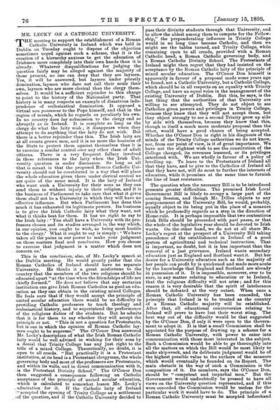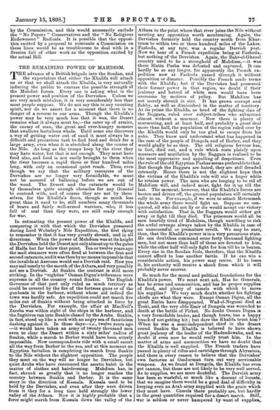MR. LECKY ON A CATHOLIC UNIVERSITY.
'THE meeting to support the establishment of a Roman Catholic University in Ireland which was held in Dublin on Tuesday ought to dispose of the objection sometimes urged against such a scheme, that it is the creation of a hierarchy anxious to get the education of Irishmen more completely into their own hands than it is already. Whatever disqualifications for judging the question fairly may be alleged against the majority of those present, no one can deny that they are laymen. Yes, it will be answered, but laymen under priestly domination, laymen who dare not call their souls their own, laymen who are more clerical than the clergy them- selves. It would be a sufficient rejoinder to this charge to point to the history of the Nationalist party. That history is in many respects an example of disastrous inde- pendence of ecclesiastical domination. It opposed a virtual non possumus to the Pope himself, and that in the region of morals, which he regards as peculiarly his own. In no country does lay submission to the clergy end so abruptly as in Ireland. It is complete so long as the clergy do what the laity wish ; it disappears Iv hen they attempt to do anything that the laity do not wish. But there is a better rejoinder than this. The Irish laity are at all events grown men, and it is no more the business of the State to protect them against themselves than it is to exercise a similar control over any other class of adult citizens. There is a very frequent fallacy involved in these references to the laity when the Irish Uni- versity question is under discussion. So long as all that is meant is that the proposed Roman Catholic Uni- versity should not be constituted in a way that will place the whole education given there under clerical control we are quite of the same mind. It is the laity of Ireland who want such a University for their sons as they can send them to without injury to their religion, and it is the business of Parliament to take care that what it gives them shall not be a University in which they will have no effective influence. But when Parliament has done this much it has exhausted its legitimate powers. Its business is to give the Irish Catholic laity what they want, not what it thinks best for them. It has no right to say to the Irish laity : You shall have a University with its pro- fessors chosen and its studies arranged in the way which, in our opinion, you ought to wish, as being most hostile to the clergy.' What it ought to say is simply : We have taken all the pains in our power to make your judgment on these matters final and conclusive. How you choose to exercise that judgment is a matter which does not concern us.'
This is the conclusion, also, of Mr. Lecky's speech at the Dublin meeting. He would greatly prefer that the Roman Catholics of Ireland should have no separate University. He thinks it a great misfortune to the country that the members of the two religions should be educated apart "at the time when the friendships of life are chiefly formed." He does not believe that any sectarian institution can give Irish Roman Catholics as good an edu- cation as they can obtain in the existing mixed Colleges. He feels sure that if they would accept the principle of united secular education there would be no difficulty in providing Catholic professors to teach theology and ecclesiastical history, and to superintend the performance of the religious duties of the students. But he admits that it is for them to say whether they will accept the principle or not. "This is not a question for Protestants, but is one in which the opinion of Roman Catholic lay- men ought to be supreme." The O'Conor Don answered Mr. Lecky's description of what the Irish Roman Catholic laity would be well advised in wishing for their sons by a denial that Trinity College has any just right to the title of a mixed College. Theoretically, no doubt, it is open to all creeds. "But practically it is a Protestant institution, at its head is a Protestant clergyman, the whole governing body and most of the professors are Protestants, and within its walls, and in direct communication with it, is the Protestant Divinity School." The O'Conor Don then suggested a consequence following on Catholic acceptance of the principle of united secular education, which is calculated to somewhat lessen Mr. Lecky's . admiration for it. If the Catholic laity of Ireland -" accepted the opening of Trinity College as a settlement of the question, and if the Catholic University decided to pass their divinity students through that University, and to allow the ablest among them to compete for the Fellow- ship," the preponderating influence in Trinity College would in no long time become Catholic, and then we might see the tables turned, and Trinity College, while remaining open to all creeds, provided with a Roman Catholic head, a Roman Catholic governing body, and a Roman Catholic Divinity School. The Protestants of Ireland might then regret that they had insisted on the acceptance by the Roman Catholic laity of the principle of mixed secular education. The O'Conor Don himself is apparently in favour of a proposal made some years ago to found, not a Catholic University, but a Catholic College, which should be in all respects on an equality with Trinity College, and have an equal voice in the management of the existing University of Dublin. But this, he says, is the last thing that the authorities of that University are willing to see attempted. They do not object to see Catholics given powers and privileges in Trinity College, because they know that they will not accept them, but they object strongly to see a second Trinity grow up side by side with themselves, because they know that this, though in itself a much more moderate proposal than the other, would have a good chance of being accepted. Whether the O'Conor Don is right in his diagnosis of the minds of the Trinity College authorities we do not know, nor, from our point of view, is it of great importance. We have not the slightest wish to see the constitution of the College changed, its revenues lessened, or its privileges interfered with. We are wholly in favour of a policy of levelling up. To leave to the Protestants of Ireland all that they have, and to give to the Catholics of Ireland all that they have not, will do most to further the interests of education, while it promises at the same time to furnish the line of least resistance.
The question when the necessary Bill is to be introduced presents greater difficulties. The promised Irish Local Government Bill is likely to occupy a large part of the coming Session, and though Mr. Dillon objects to any postponement of the University Bill, he would, probably, equally object to its being put in the place of a. measure which he professedly regards as a step in the direction of Home-rule. It is perhaps impossible that two contentious Irish Bills should be proceeded with pan i passu, or that the whole of the legislative year should be devoted to Irish wants. On the other hand, we do not at all share Mr. Lecky's regret at the prospect of a University Bill taking precedence of the establishment in Ireland of a good system of agricultural and technical instruction. That is important, no doubt, but it is less important than the removal of a just grievance. Ireland wants secondary education just as England and Scotland want it. But her desire for a University education such as the majority of her people can profit by is quickened and made more acute by the knowledge that England and Scotland are already in possession of it. It is impossible, moreover, ever to be sure, in any matter relating to education or to Ireland, that the religious difficulty will not arise ; and for this reason it is very desirable that the spirit of intolerance should be defeated at the very outset. When once a Roman Catholic University has been conceded, the principle that Ireland is to be treated as the country of a Roman Catholic majority will be established. After that, all educational controversies relating to Ireland will prove to have lost their worst sting. The best way out of the difficulty would be that suggested by the O'Conor Don, if only it were open to the Govern- ment to adopt it. It is that a small Commission shall be appointed for the purpose of drawing up a scheme for a Roman Catholic University, with power to enter into communication with those most interested in the subject. Such a Commission would be able to go thoroughly into all the matters on which the Bill would be most likely to make shipwreck, and its deliberate judgment would be of the highest possible value to the authors of the measure which would eventually be founded on its Report. The main obstacle in the way of such a Commission is the composition of it. Its members, says the O'Conor Don, should be "competent and impartial men." But the Government would undoubtedly be pressed to have all views on the University question represented, and if this were conceded the Commission would be useless for the particular work it would have to do. The principle of a Roman Catholic University must be accepted beforehand by the Commission, and this would necessarily exclude the "No Popery" Conservatives and the "No Religious Endowment" Radicals. It is possible that the opposi- tion excited by a proposal to nominate a Commission on these lines would be as troublesome to deal with in a Session full of other work as the opposition excited by the actual Bill.



































 Previous page
Previous page